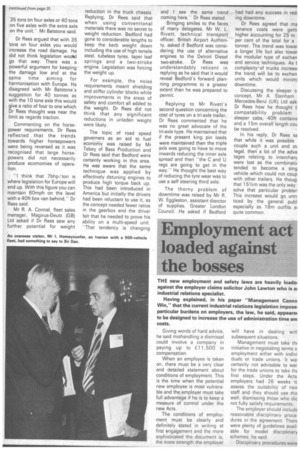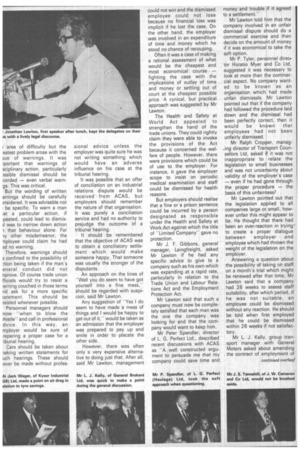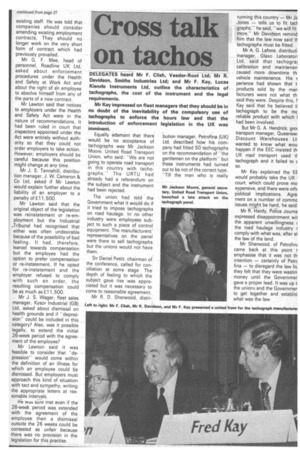Employment act loaded against the bosses
Page 28

Page 29

Page 30

If you've noticed an error in this article please click here to report it so we can fix it.
THE new employment and safety laws are heavily loadei against the employer claims solicitor John Lawton who is au industrial relations specialist.
Having explained, in his paper "Management Canno Win," that the current industrial relations legislation impose: particular burdens on employers, the law, he said, appearet to be designed to increase the use of administration time ant costs.
Giving words of hard advice, he said mishandling a dismissal could involve a company in paying up to E11,500 in compensation.
When an employee is taken on, there must be a very clear and detailed statement about conditions of employment. This is the time when the potential new employee is most vulnerable and the employer must take full advantage if he is to keep a measure of control under the new Acts.
The conditions of employment must be clearly and definitely stated in writing at first engagement and the more sophisticated the document is, the more strength the employer will have in dealing vvitl subsequent situations.
Management must take thi initiative in negotiating terms o employment either with indivi duals or trade unions. It wa! certainly not advisable to wai for the trade unions to take th( first steps. Under the Acts employers had 26 weeks tc assess the suitability of nev\ staff and they should use thiE well, dismissing those who dic not fully satisfy requirements.
The employer should include reasonable disciplinary procedures in the agreement. There were plenty of guidelines available for model disciplinary schemes, he said.
Disciplinary procedures were area of difficulty but the eatest problem arose with the 3ue of warnings. It was Iportant that warnings of sciplinary action, particularly )ssible dismissal should be corded — even verbal warngs. This was critical.
But the wording of written arnings should be carefully )nsidered. It was advisable not be specific. To warn a man 'at a particular action, if .peated, could lead to dismisil was to narrow down action that behaviour alone. For other misdemeanor, the -nployee. could claim he had 3d no warning.
Therefore, warnings should a confined to the possibility of :don being taken if the man's eneral conduct did not nprove. Of course trade union fficials wouldtry to resist a ,arning couched in those terms nd ask for a more specific tatement. This should be sisted whenever possible.
Personnel managers should now "when to blow the thistle'' and call in professional dvice. In this way, an mployer would be sure of reparing a proper case for a .ibunal hearing.
Care should be taken about laking written statements for uch hearings. These should ever be made without profes sional advice unless the employer was quite sure he was not writing something which would have an adverse influence on his case at the tribunal hearing.
It was possible that an offer of conciliation on an industrial relations dispute would be received from ACAS, but employers should remember the nature of that organisation. It was purely a conciliation service and had no authority to prejudge the outcome of a tribunal hearing.
It should be remembered that the objective of ACAS was to obtain a conciliatory settlement which would make someone happy. That someone was usually the stronger of the disputants.
An approach on the lines of "Well you do seem to have got yourself into a fine mess," should be regarded with suspicion, said Mr Lawton.
Any suggestion of "Yes I do seem to have made a mess of things and I would be happy to get out of it," would be taken as an admission that the employer was prepared to pay up and smile in order to placate the other side.
However, there was often only a very expensive alternative to doing just that. After all, said Mr Lawton, management could not win and the dismissed employee could not lose because no financial loss was implicit if he lost the case. On the other hand, the employer was involved in an expenditure of time and money which he stood no chance of recouping.
Often it was a case of making a rational assessment of what would be the cheapest and most economical course — fighting the case with the implications of outlay of time and money or settling out of court at the cheapest possible price. A cynical, but practical approach was suggested by Mr Lawton.
The Health and Safety at World Act appeared to strengthen the hand of the trade unions. They could rightly claim they were able to invoke the provisions of the Act because it concerned the welfare of people. However, there were provisions which could be of use to the employer. For instance, it gave the employer scope to insist on periodic medical examination and staff could be dismissed for health reasons.
But employers should realise that a fine or a prison sentence could be incurred by a person designated as responsible under the Health and Safety at Work Act against which the title of "Limited Company" gave no protection.
Mr J. F. Gibbons, general manager, Laingfreight, asked Mr Lawton if he had any specific advice to give to a company such as his own which was expanding at a rapid rate, particularly in relation to the Trade Union and Labour Relations Act and the Employment Protection Act.
Mr Lawton said that such a company must now be completely satisfied that each man was the one the company was looking for and that the company would want to keep him.
Mr Peter Spandler, director of L. G. Perfect Ltd., described recent discussions with ACAS as "A well constructed argument to persuade me that my company could save time and money and trouble if it agreed to a settlement."
Mr Lawton told him that the company involved in an unfair dismissal dispute should do a commercial exercise and then decide on the amount of money if it was economical to take the soft option.
Mr P. Tyler, personnel direc• tor Horatio Myer and Co Ltd, suggested it was necessary to look at more than the commercial aspect. No company wanted to be known as an organisation which had made unfair dismissals. Mr Lawton pointed out that if the company had followed the procedure laid down and the dismissal had been perfectly correct, then it would be known that employees had not been unfairly dismissed.
Mr Ralph Cropper, managing director of Transport Counsellors Ltd, asked if it was not inappropriate to relate the legislation to smelt businesses and was not uncerltainty about validity of the employer's case — even if he had gone through the proper procedure — the basis of this unfairpess? Mr Lawton pointed out that the legislation apPlied to all companies large oil small, however unfair this miPht appear to be. He thought that there had been an over-reaction in trying' to create a proper dialogue between employer and employee which had thrown the weight of the legislation on the employer.
Answering a question about the possibility of taking on staff on a month's trial which might be renewed after that time, Mr Lawton said that a company had 26 weeks to assess staff suitability, after which period, if he was not suitable, an employee could be dismissed without any reaction. He should be told when first employed that he could be dismissed within 26 weeks if not satisfactory.
Mr L. J. Kelly, group transport manager with General Motors asked about amending the contract of employment of existing staff. He was told that companies should consider amending existing employment contracts. They should no longer work on the very short form of contract which had previously prevailed.
Mr G. F. Mee, head of personnel, Roadline UK Ltd, asked about enforcement procedures under the Health and Safety at Work Act and about the right of an employee to absolve himself from any of the parts of a new contract.
Mr Lawton said that notices to employers under the Health and Safety Act were in the nature of recommendations. It had been ruled in court that inspectors appointed under the Act were entirely without authority so that they could not order employers to take action. However, employers should be careful because this position might change at any time.
Mr J. S. Tannehill, distribution manager, J. W. Cameron & Co Ltd, asked if Mr Lawton would explain further about the liability of an employer to a penalty of f.11, 500.
Mr Lawton said that the original object of the legislation was reinstatement or re-employment but the Industrial _Tribunal had recognised that either was often undesirable because of the possibility of bad feeling. It had, therefore, leaned towards compensation but the employee had the option to prefer compensation or re-instatement. If he opted for re-instatement and the employer refused to comply with such an order, the resulting compensation could be as much as £11,500.
. Mr J. S. Wager, fleet sales manager, Kysor Industrial (GB) Ltd, asked about dismissal on health grounds and if "depression" could be included in this category? Also, was it possible legally, to extend the initial 26-week period with the agreement of the employee?
Mr Lawton said it was feasible to consider that "depression" would come within the definition of an illness for which an employee could lie dismissed. But employers must approach this kind of situation with tact and sympathy, writing the appropriate letters at reasonable intervals.
He was sure mat even if the 26-wee.k period. was extended with the agreement of the employee then a dismissal outside the 26 weeks could be contested as unfair because there was no provision in the legislation for this practise.




















































































